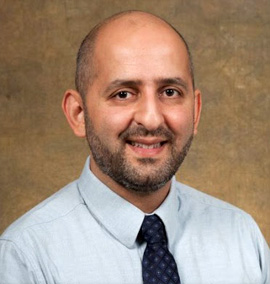Arash Javanbakht (dz0083)
University information
Contact information
Psychiatry and Behavioral Neurosciences
Associate Professor (Clinical Scholar)
Tolan Park Medical Building
3901 Chrysler Service Dr
Detroit, Michigan 48201
313-577-1561
Arash Javanbakht, M.D., is a psychiatrist and neuroscientist, founding director of the Stress, Trauma, and Anxiety Research Clinic (STARC) at Wayne State University School of Medicine. He is nationally known for his clinical and research work on anxiety, trauma, and PTSD. He is heavily involved in treatment of civilians, refugees, and first responders with PTSD.
Dr Javanbakht researches the biological, psychological, and factors of risk and resilience among refugee children and adults. This work is funded by an NICHD R01 award and examines epigenetic, autonomic, parenting, and environmental elements of trauma impact. STARC also uses art, dance and movement, and yoga and mindfulness in helping refugee families overcome stress.
Dr Javanbakht work in treatment and research of trauma among first responders is funded by the State of Michigan.
STARC is also a national leader in utilization of patented artificial intelligence and augmented reality and telemedicine technologies for treatment for anxiety disorders and PTSD. This work is funded by the State of Michigan, and the DoD.
Dr Javanbakht is recipient of the Anxiety and Depression Association of America Distinguished Member Award, The Society for Biological Psychiatry Humanitarian Award, and International Society for Traumatic Stress Studies Distinguished Member Award.
Dr Javanbakht's work has been featured on the CNN, Aljazeera, NPR, Scientific American, Washington Post, Smithsonian, PBS, Science, Lancet, American Psychiatric Association, Anxiety and Depression Association of America, American Academy of Child and Adolescent Psychiatry, Society of Biological Psychiatry, and tens of other media outlets.
He is the author of the book “Afraid: Understanding the Purpose of Fear, and Harnessing the Power of Anxiety”.

Translational Neuroscience Program
Arash Javanbakht, M.D., is a psychiatrist and serves as the director of the Stress, Trauma, and Anxiety Research Clinic (STARC). His work is focused on anxiety, trauma, and PTSD specifically among refugees and first responders.
STARC is funded by NICHD R01 to examine the longitudinal impact of exposure to war trauma in adults and children Syrian and Iraqi refugees, and biological (epigenetics, inflammation, autonomic responses) and psychological factors of risk and resilience in children and adults. Also, use of art, dance and movement, and yoga and mindfulness in helping refugee families overcome stress. Other studies examine exercise and mental health and genetic aging, and trauma among first responders.
We also develop and research utilization of cutting edge of augmented reality and telemedicine for in vivo treatment for phobias and PTSD.
Disease/Disorder
GAD, Phobias, PTSD, Depression
Species
Human
Methods
brain imaging, psychophysiology, epidemiology, epigenetics, inflammatory markers, augmented reality.
Key Collaborators
Tanja Jovanovic, Nicole Nugent (Brown), Alicia Smith (Emory), David Rosenberg, Alireza Amirsadri.

Courses taught by Arash Javanbakht
Fall Term 2024
Fall Term 2023
Recent university news spotlights
- Dealing with anxiety in times of political uncertainty
- How augmented reality is advancing brain and mental health treatment
- Why the news feels overwhelming — and how to cope
- Two-thirds of US adults tuning out political news, poll finds
- A nation exhausted: The neuroscience of why Americans are tuning out politics
- Protecting mental health and avoiding drama during the holidays
- Unreal that feels real: Pioneering technology developed at Wayne State to treat PTSD uses augmented reality and artificial intelligence
- Experts share tips to handle anxiety after election
- DJ’s bring voters to polls with music, energy to ease election anxiety in metro Detroit
- Studies show just 30 minutes of this type of exercise gives you the biggest brainpower boost